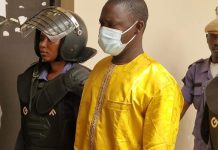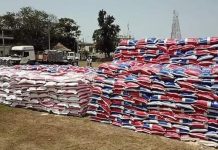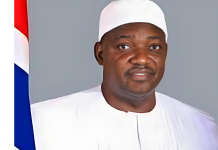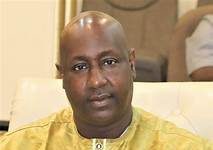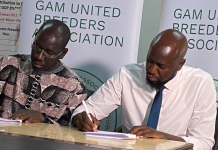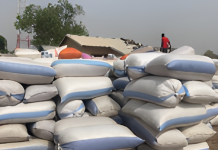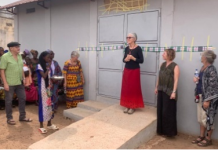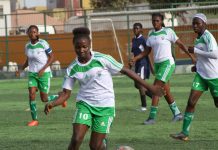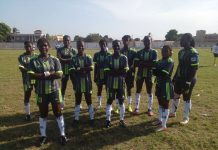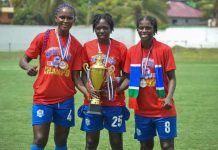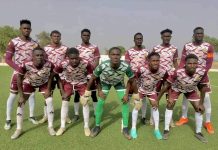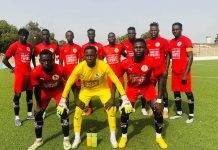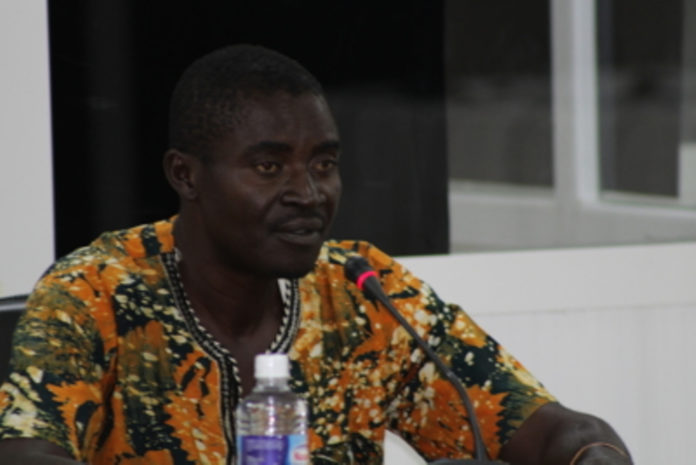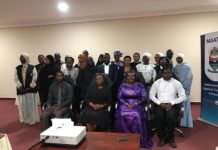By Yankuba Jallow
Ex-Private Sait Darboe has on Thursday the 21st February 2019 given a detailed narration about the 11th November massacre of soldiers.
“We were going for two things; we either take over the State House or go to the grave yard,” the witness said while explaining the readiness of the counter coups plotters of 11th November 1994.
About the July 22 Coup Preparation
He said Lt Edward Singhatey used to talk to them (the junior soldiers) about how they feel about the army as well as the presence of the Nigerian soldiers in the army. He added that Singhatey used to ask them how they feel about the government.
“Edward used to tell us that they were up to something and when they are ready, we will be informed about it,” the witness said.
He told the Commission that Lieutenants Yahya Jammeh, Edward Singhatey and Sadibou Hydara used to hold meetings somewhere in the Yundum Barracks called ‘the Bahamas’.
“The ECO-Company was the company used to do the coup d’état. Edward Singhatey used to come and tell us that they wanted to get rid of the government and replace it with another one,” he stated.
He said without the junior soldiers, the July 1994 coup won’t have been successful.
July 22nd Coup day
He said the coup was scheduled to take place on the 21st July 1994 at the airport where President Jawara would have been arrested. He said before they departed for the airport, the weapons were inspected by RSM Jeng to ensure that they were all emptied because we were not supposed to go with live rounds at the airport.
“Yahya Jammeh and Edward Singhatey were both armed,” he said.
He said at the airport, both Edward Singhatey and Yahya Jammeh had their pistols filled with live rounds.
“The plan was to gun down President Jawara by Edward Singhatey. Yahya Jammeh was supposed to release gunshots into the air and disclose the coup at the airport and demand Sir Dawda to surrender. Sanna Sabally was left at the Yundum Barracks with a platoon and they were heavily armed. They were supposed to take over the airport security because we were all not armed,” he said.
“The plan was to capture the Yundum and Fajara Barracks and as well capture the State House,” he said.
He said at the airport, Singhatey and Jammeh were both disarmed and the guard of honour couldn’t take place. He added that they went back to the Yundum Barracks and held a discussion with Edward Singhatey, Sanna Sabally, and Sadibou Hydara on the way forward since their plan became futile. He said whilst they were meeting, Singhatey, Sabally, and Hydara were with their passports, planning to flee the country but they were discouraged by the junior soldiers to stay. He said the coup leaders including Edward Singhatey and Yahya Jammeh were to be arrested on the 22nd July 1994 by the authorities.
“We told them to stay and not to worry about them being arrested because they can still make it (stage the coup),” he said.
The Nigerians did not play anything in July 1994
He said on that night, the junior soldiers took over the Yundum Barracks and it was the same night that Lieutenant Basirou Barrow assured Yahya Jammeh of his support to the coup.
“We were going for two things; we either take over the State House or go to the grave yard,” the witness said.
On the early morning of July 22nd, they seized vehicles and headed to Banjul because they were in a haste to avoid Yahya Jammeh, Edward Singhatey, Yankuba Touray, Sanna Sabally and Sadibou Hydara being arrested. He said before they left for Banjul, the seized vehicles were taken into the Yundum Barracks for soldiers who were deemed to be the loyalist to the coup to board on them.
He said Edward Singhatey was dropped at the airport junction with few soldiers to take charge of the airport and when they reached Westfield, the GAMTEL connection wires were removed and the Gendarmerie officers guarding the place were arrested and taken to the Yundum Barracks.
The witness told the Commission that he was armed with an RPG and another weapon type. He explained that he joined Sabally to invade the Fajara Barracks with not more than 15 soldiers. He said they entered through the back gate of the Barracks and began firing into the air which caused the Gendarmerie officers and their families to run in different directions. He added that the Gendarmerie later fired back at them and after about 15 minutes they (the Gendarmerie) surrendered.
“The Fajara Barracks was taken over after the armory was captured,” he said.
He said they mounted a checkpoint at the back gate of the Barracks and he, Sergeant Ousman Sonko (the former Interior Minister) and one Sisawo Fatty were assigned by Sanna Sabally to go to GAMTEL to disconnect all wires so that there won’t be any communications from outside the world. He said they didn’t go to GAMTEL instead they went to Yundum Barracks to collect ammunitions from Lt Basirou Barrow and took them to Sanna Sabally at the Fajara Barracks as well as supplied Yahya Jammeh and his group who were around the Mile II Prisons and the soldiers stationed at the Denton Bridge.
“We returned to the Fajara Barracks and informed Sanna Sabally that the mission was accomplished although we didn’t go to any GAMTEL station,” he said.
A day after the coup
He said they went to the State House and he was attached as an escort under Yahya Jammeh.
“After taking over the State House, the junta failed us because they couldn’t fulfill their promises. We were frustrated with Junta,” he said.
He said they were promised by the coup leaders that after a successful coup, they will be allocated each with a plot of land, improve their conditions (welfare) and as well take them for overseas training. He said Lt Basirou Barrow was supposed to be the leader of the Junta but he declined owing to his weakness in public speaking.
“At this time, Sanna Sabally pointed a pistol to Yahya Jammeh and told him that ‘you are the chairman’ and Jammeh responded to Sabally that you are the vice chairman,” he adduced.
He said Yahya Jammeh was not a complete soldier and he was not much known by the soldiers. He added that soldiers joined his group, not because of him but the presence of Captain Sonko.
“Yahya Jammeh was not a tactical soldier because he couldn’t lead a section of an army to talk less of a platoon,” he said.
He said the soldiers that supported the coup were not up to 40 and mainly young with the ranks of Private and Lance Corporal. He said in October 1994, he was posted at the Yundum Barracks.
He said the AFPRC leadership created mistrust among soldiers in the Barracks by passing an order that no two soldiers are allowed to hold private discussions.
“We felt angry and that was the cause of November 11 attempted coup,” he said.
November 11
He said one Sergeant Fafa Nyang used to tell him that they were planning to get rid of the AFPRC government and one ‘Dot Faal’ used to brief him on their ongoing plan to stage the coup.
“The November 11 attempted coup was well planned and the leaders were trusted soldiers in the army including Lt Basirou Barrow. The plan was to attack the State House and get rid of the Junta,” he said.
He said the coup plan was leaked to the Junta.
“The idea of the November 11 coup was well known to the Junta members,” he said.
He said on the 8th November 1994, all the AFPRC Council members except Yahya Jammeh and the then Chief of Defense Staff, Lt Colonel Baboucar Jatta came to the Yundum Barracks to address them about the coup. He said the delegation was headed by Sanna Sabally who told them that the coup won’t work. He said Sabally told them to unite and become a family and not to try to create problems in the country. Thereafter, he said Edward Singhatey released three gun shots into the air.
He said Lt Barrow was transferred to the Fajara Barracks but this has not affected the coup plan because it was not abandoned.
According to the witness, on the 10th November 1994, one Buba Jammeh, a brother to Yahya Jammeh was the chairman of the Council called Sanna Sabally and informed him that some soldiers were moving within the Barracks armed.
He said in the evening of the 10th November, they were all discouraged because they didn’t see their leaders to carry on with the planned coup. He said in the evening, he jumped over the fence and went home in Bakau. He said whilst in Bakau at night, he heard gunshots from the Fajara Barracks.
He said in the morning of the 11th November, he went to the Yundum Barracks dressed in military uniform and later went to the armoury and took arms because the situation was fragile.
“I climbed a truck and saw the dead bodies of Lieutenant Basirou Barrow and ‘Dot Faal’ lying,” he said.
He said a few moments later, he turned and saw a group of soldiers beating Sergeant Fafa Nyang around the cooks’ house within the Barracks. He said the soldiers who participated in beating Sergeant Nyang included Sergeant Alagie Kanyi, Lance Corporal Colley, Baboucar Sanyang, Buba Jammeh and many other soldiers. He said Sergeant Nyang suffered before he died because he was tortured until his waist got broken. He said at this time, the four Council members in the persons of Edward Singhateh, Sanna Sabally, Yankuba Touray, and Sadibou Hydara, as well as Momodou Badjie (the current security adviser to President Barrow) and CDS Baboucar Jatta, were all present.
“Lance Corporal Colley shot Sergeant Fafa Nyang in the dug grave because he was buried alive,” he said.
He said it was Sanna Sabally who passed the order that all those involved in the coup should be executed.
“Lt Barrow, Sergeant Nyang and ‘Dot Faal’ were all buried in one grave and I was viewing the soldiers whilst they were burying them,” he said.
He said the place where they were buried was not deep and those who participated in their burial included Alagie Kanyi and Baboucar Sanyang. He added that some soldiers were also arrested and detained in relation to the coup.
“Lt Colonel Momodou Badjie was present at the time of the execution of the captured soldiers on the 11 November,” he said.
He adduced that Badjie who is currently the security adviser to President Adama Barrow was present at the range where the captured soldiers were butchered.
The Execution of the captured soldiers
He said the captured soldiers included Lt Gibril Sey, Lt Buba Jammeh, Bakary Manneh, Cadet Sillah, Corporal Dampha (who was not executed) among others. He said the group that executed these captured soldiers were headed by Sanna Sabally. He said the group members included Momodou Badjie, CDS Baboucar Badjie, Edward Singhateh, Peter Singhateh, Sadibou Hydara, Yankuba Touray and their soldiers (guards).
He explained that it was RSM Papu Gomex who tied the hands of the captured soldiers and packed them into a land rover.
“They were taken to Lance Corporal Bojang’s Range behind the Nyambai Forest which is about 4 to 5 kilometres from Siffoe,” he said.
He said the executed bodies were taken back to the Yundum Barracks by the group and placed around the cooks’ house.
“They were killed with the use of a gun. These people were butchered; one of them had his leg broken and eye removed. They had blood all over their bodies,” he said.
He said later, the Council members went to the Independence Stadium to witness the match the Gambia played against Liberia.
“Before they left for the Stadium, Sergeant Ceesay who was detained was called out from the cell where he was detained and shot by Corporal Mboob in the presence of the Council members and their entourage,” he said.
The Burial of the executed soldiers
He said they were buried next to where Lt Barrow and 2 others were buried.
“Alagie Kanyi cut the legs of Sergeant Sey with an axe because he was tall so that he could fit,” he said.
His Biography and Career in the Army
He said he was born on the 1st January 1970 in Bakau Kachically. He said after completing schooling in 1989, he joined the Gambia National Army (GNA) and remained as a Private Soldier until July 1994. He said he was sent to Liberia in the year 1991 under the ECOMOG for 10 months and when he came back, he was posted at the Yundum Barracks. He said he was under the Company headed by Captain Lie Conteh; where Lieutenant Edward Singhateh and Lieutenant OB Mbye were the platoon commanders. He said their company was called the ECO-Company.
